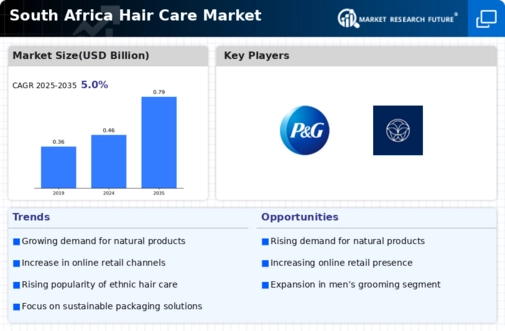Market Share
South Africa Hair Care Market Share Analysis
The South Africa hair care market is characterized by dynamic trends shaped by evolving consumer preferences, socio-economic factors, cultural influences, and technological advancements. One prominent trend in the market is the increasing demand for natural and organic hair care products. With growing awareness of the potential health risks associated with synthetic ingredients and chemical additives, consumers are gravitating towards products formulated with plant-based ingredients, botanical extracts, and essential oils. Natural hair care products cater to the needs of consumers seeking gentler, more sustainable alternatives that promote hair health and environmental sustainability.
Another significant trend driving the South Africa hair care market is the rise of multicultural and Afro-centric hair care products. South Africa has a diverse population with a wide range of hair textures, including Afro-textured hair, which requires specialized care and styling products. As a result, there is a growing demand for products tailored to the unique needs of Afro-textured hair, such as moisturizing shampoos, nourishing conditioners, and styling creams designed to enhance curl definition and manageability. Multicultural hair care brands are capitalizing on this trend by offering inclusive product ranges that celebrate diverse hair textures and promote self-expression and empowerment.
Furthermore, the increasing prevalence of hair care-related concerns, such as hair loss, scalp issues, and hair damage, is driving demand for specialized hair care solutions in the South Africa market. Factors such as pollution, stress, lifestyle changes, and chemical treatments contribute to hair and scalp problems, prompting consumers to seek targeted treatments and remedies. Brands are responding to this demand by launching products formulated with active ingredients, vitamins, and botanical extracts known for their nourishing, strengthening, and revitalizing properties. Additionally, brands are investing in research and development to innovate new formulations and technologies that address specific hair care needs and deliver visible results.
Moreover, the digital revolution and e-commerce boom are reshaping the South Africa hair care market, offering consumers greater accessibility, convenience, and choice when purchasing hair care products. The rise of online platforms, social media influencers, and digital marketing channels has democratized access to information, enabling consumers to research products, read reviews, and make informed purchasing decisions. E-commerce platforms provide a convenient shopping experience, allowing consumers to browse, compare, and purchase hair care products from the comfort of their homes, regardless of geographic location or physical retail availability.
Additionally, shifting beauty ideals and fashion trends influence consumer preferences and purchasing behavior in the South Africa hair care market. As societal attitudes towards beauty evolve and cultural representations become more diverse and inclusive, consumers are embracing their natural hair textures and experimenting with different hairstyles, colors, and trends. This cultural shift towards self-expression and individuality drives demand for hair care products that support diverse styling options, encourage creativity, and enhance personal identity.
Furthermore, sustainability and ethical considerations are increasingly important factors shaping market trends in the South Africa hair care market. Consumers are becoming more environmentally conscious and socially responsible, seeking products that align with their values and support ethical and sustainable practices. Brands are responding by adopting eco-friendly packaging, sourcing responsibly sourced ingredients, and implementing ethical manufacturing processes to minimize their environmental footprint and contribute positively to society. Sustainable hair care brands are gaining traction among eco-conscious consumers, driving demand for products that prioritize environmental sustainability and social responsibility.





Leave a Comment